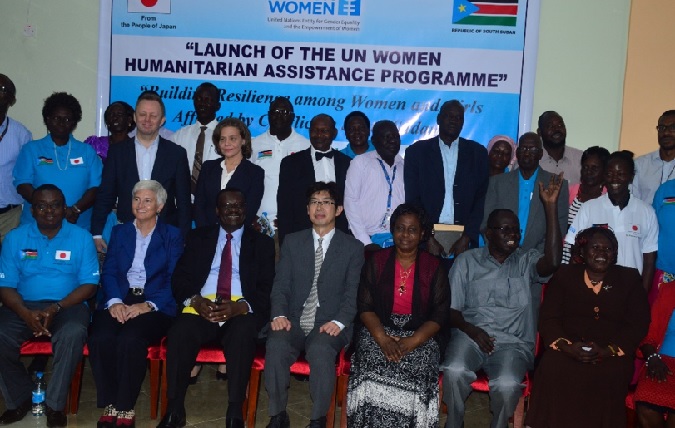The Government of Japan supports Gender Equality and the Empowerment of Women in South Sudan
Date:

The Government of South Sudan, represented by the Ministry of Humanitarian Affairs and Disaster Management officially launched the UNWOMEN Humanitarian Assistance Programme on Friday December 4, 2015 at Landmark Hotel in Juba. The Government of Japan provided US$ 3.5 million to UNWOMEN as funding to the programme which aims to build resilience of over 6,000 women and girls affected by conflict.
The two year programme will be implemented in Central Equatoria State (Juba County), Lakes State (Awerial County) and Eastern Equatoria State (Pageri Administrative Area).
The UNWOMEN Humanitarian Assistance Programme will contribute to filling critical gender gaps in the ongoing humanitarian response in South Sudan. The programme will also provide technical and capacity building support to the Ministry of Humanitarian Affairs and Disaster Management and other international and national humanitarian actors, to ensure that gender equality and women’s empowerment needs and rights are adequately and sustainably integrated into all future humanitarian response and recovery strategic plans.
In his welcome statement, Mr. Lansana Wonneh, the UNWOMEN Deputy Country Representative intimated that the programme will complement the work of other humanitarian actors in South Sudan particularly the hard hit and most vulnerable population of women, girls and children affected by conflict.
In his key note statement, His Excellency, Kiya Masahiko, the Japanese Ambassador to South Sudan emphasized the Government of Japan’s commitment to continue supporting gender equality and women’s empowerment. The Ambassador also revealed the contribution of the Japanese Government to the UN General Assembly in 2013 to a tune of 3 billion USD within three years to address the issues of gender inequality and women empowerment.
Sue Lautze, Deputy Humanitarian Coordinator, speaking on behalf of the Humanitarian Coordinator, reiterated the suffering of women and girls and the risky coping mechanisms such as transactional sex which further exposed them to sexual and gender-based violence. She encouraged stakeholders to remove the phrase “Building Resilience among Women and Girls affected by Conflict in South Sudan” written at the back of their t-shirts and imprint it on their hearts”.
The programme was launched by the Professor Lokulenge Lole, the Chairperson of the South Sudan Relief and Rehabilitation Commission who also represented the Minister for Humanitarian Affairs and Disaster Management. The Professor said “this programme comes at a critical time when our women and girls are still the most affected and marginalized group in our community” He also commended the programme for taking into account the needs of the host community who normally bears the burden associated with IDPs settlements.
Professor Lokulenge thanked the Government and People of Japan for their commitment to support the people of South Sudan. The Professor, in closing reiterated the commitment of the Government of South Sudan to ensuring success of the Humanitarian Assistance Programme.